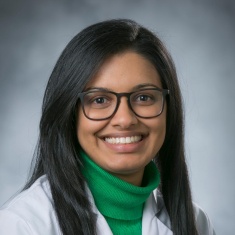 Neema Sharda, MD, assistant professor of medicine (Geriatrics), will discuss the aging voice as part of a daylong community workshop at the Cary Arts Center on September 7, 2019.
Neema Sharda, MD, assistant professor of medicine (Geriatrics), will discuss the aging voice as part of a daylong community workshop at the Cary Arts Center on September 7, 2019.
“Your voice is how you interact and engage with the world around you,” Sharda says. “Vocal impairments can be a real quality-of-life concern.”
The workshop, called “Let Your Voice be Heard: Healthy Singing and Speaking Voice for Older Adults,” is being organized by speech pathologists Caroline Banka, MS, CCC-SLP, and Cristen Paige, MS, CCC-SLP of the Duke Voice Care Center.
In older adults, the voice can become quiet, breathy, or hoarse as the muscles of the vocal folds atrophy. Medical conditions common in the aging population can also contribute to voice problems.
“I treat people who are dealing with voice changes due to aging daily,” Paige says. “It’s a huge patient population of ours.”
Paige and Banka emphasize treating the “whole vocal instrument,” not just the vocal folds. This means working with the breath to power the voice and using the oral cavity to enhance resonance.
Attendees will have lots of opportunity to practice over the course of the daylong workshop. “We focus on air flow and the breath and other voice exercises to put it all together,” Paige says. “This is something that can be improved with a little bit of guidance. You don’t have to accept it as a normal part of aging.”
Sharda will explain how medical conditions can impact the voice in her presentation. “There are medical issues that might need to be addressed to solve or alleviate some of those [vocal] challenges,” she says. These can include lung disease, Parkinsonism, gastric reflux, allergies, sinusitis, dehydration, and some medications.
Sherri L. Smith, AuD, PhD, will speak about the effects that hearing loss and hearing aids can have on how we hear and modulate our own voices. Hearing screenings will be available all day.
The workshop runs from 9:00-4:00 with a one-and-a-half hour break for lunch. It will include lectures, voice work, and breakout sessions related to both speaking and singing. There will also be a performance by 100 Men in Black, a local all-male community-based chorus.
Banka hopes that the workshop will not only help participants improve their voices but also raise awareness about the importance of voice. “We know that one of the strongest predictors for longevity is social connection,” she says, “and the voice plays a big role in that. There’s so much attention about hearing loss in older adults but very little awareness about what’s going on with the voice.”
For more information about the aging voice and the September 7 workshop, including information about how to register, go to https://www.dukehealth.org/blog/5-steps-keeping-aging-voice-healthy